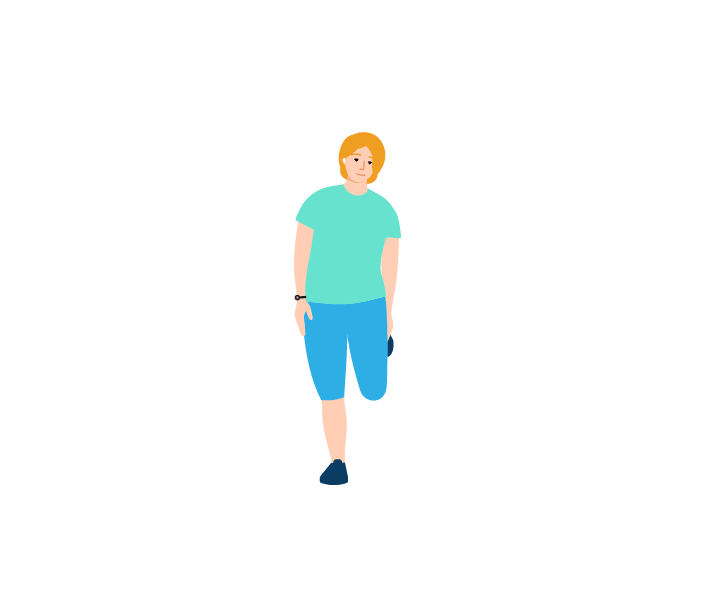Can alcohol affect sports performance and fitness levels?
Find out how alcohol can affect your performance and fitness.
Whether you enjoy casual exercise, are in the gym every day, or compete in regular matches or events, it’s good to understand the effects alcohol can have on sports performance and fitness.
Alcohol can be detrimental to your sporting performance. There are a few main reasons:
Alcohol is a diuretic – it makes you pee more. Drinking can lead to dehydration because alcohol reduces the amount of urine our kidneys absorb.1 Exercise makes us sweat as our body temperature rises. So, combined, sweating and the diuretic effect of alcohol make dehydration much more likely.2,3,4
This can mean your performance takes a hit because hydration in essential for exercise to maintain normal flow of blood through our bodies – enabling oxygen and nutrients to reach our muscles and all the body's organs.
It’s important to drink plenty of water to stay hydrated and replace water lost through physical activity. And if you drink any alcohol after exercise, drinking additional water is essential to prevent dehydration.
Alcohol compromises your motor skills, balance, hand-eye coordination, and reaction time, which negatively affect our performance and increases the risk of injury.5 It affects your brain function – slowing your reaction times, affecting your balance and making you more impulsive.6
You are more likely to have an accident or vomit and, at its most extreme, excessive, heavy drinking can cause loss of consciousness, with the risk that breathing stops.7
Alcohol interferes with the body's metabolism too. Drinking alcohol causes an increase in insulin secretion, which leads to low blood sugar (otherwise known as hypoglycaemia).
Exercise requires normal levels of sugar in the blood to give us energy. Drinking alcohol causes your blood sugar levels to fall, which will negatively affect your sporting performance.8
Doing regular exercise is a great way of maintaining a healthy weight. Good nutrition is vital for sporting performance, so, if you want to perform at your best, you should keep an eye on your alcohol consumption – all alcoholic drinks are high in calories, and many are high in sugar too.
Calories from alcohol are often described as 'empty calories', meaning they have no nutritional value because they are consumed in addition to the calories your body needs. The simplest way to avoid weight gain due to alcohol is to cut down on alcohol consumption – it’s not a good idea to rely on 'burning off' excess calories from alcohol through exercise.
A hangover will affect your exercise performance. Even mild hangover symptoms, such as a headache and hypersensitivity to outside stimuli, such as light and sound,910 can have an impact on your ability to perform at your best.11
And because alcohol interferes with sleep, exercising the day after drinking alcohol can mean you’re more tired than usual, causing an all-round lower quality training session or sporting performance.12
Drinking increases the risk of abnormal, sometimes dangerous heart rhythms. This is a risk which significantly increases during exercise up to two days after heavy alcohol consumption.13,14
To get the most from your exercise session and avoid risks to your health and performance, it’s best to pass on alcohol for at least one day and night before.
Take our Drinking Check to discover if your drinking is impacting your health, wellbeing and relationships.
Any good workout means your body will need to recover afterwards – but alcohol can negatively this repair process.
One study found that alcohol reduces the rate at which your muscles repair themselves after exercise,1516 while another found that the way heavy alcohol consumption after exercise affects blood flow, metabolism and hydration can mean muscle injuries take longer to recover from.17
The UK Chief Medical Officers advise it is safest not to drink more than 14 units of alcohol a week on a regular basis. And if you do drink this much, spread it evenly over three or more days, with at least three drink-free days every week.
Regularly drinking more than the low risk drinking guidelines will put your health at risk. By cutting down how much you drink you’re likely to see a range of positive effects and better sports performance could be one of them.
A great way to cut down is by keeping track of how much you drink using our Drinkaware app, which tracks alcohol units, calories an d sleep side-by-side.
Want to know more?
Arming yourself with strategies and tips can help you or a loved one take small steps towards big results.
Last Reviewed: 21st October 2024
Next Review due: 21st October 2027
[2] Vella, L.D. and Cameron-Smith, D. (2010). Alcohol, athletic performance and recovery. Nutrients, 2(8), 781-789.
[3] Shirreffs, S.M. and Maughan, R.J. (2006). The effect of alcohol on athletic performance. Current Sports Medicine Reports, 5(4),192-196.
[5] Chikritzhs, T., & Livingston, M. (2021). Alcohol and the Risk of Injury. Nutrients, 13(8), 2777.
[8] Ghosh, P., & Pant, G. (2017). Effect of alcohol on sports performance in athletes. International Journal of Yoga, Physiotherapy and Physical Education, 2, 11–12.
[9] van SchrojensteinLantman, M., Mackus, M., van de Loo, A.J. and Verster, J.C. (2017). The impact of alcohol hangover symptoms on cognitive and physical functioning, and mood. Human Psychopharmacology: Clinical and Experimental, 32(5), e2623.
[11] Shirreffs, S.M. and Maughan, R.J. (2006). The effect of alcohol on athletic performance. Current Sports Medicine Reports, 5(4),192-196.
[13] El-Sayed, M.S., Ali, N. and Ali, Z.E.S. (2005). Interaction between alcohol and exercise. Sports Medicine, 35(3), 257-269.

